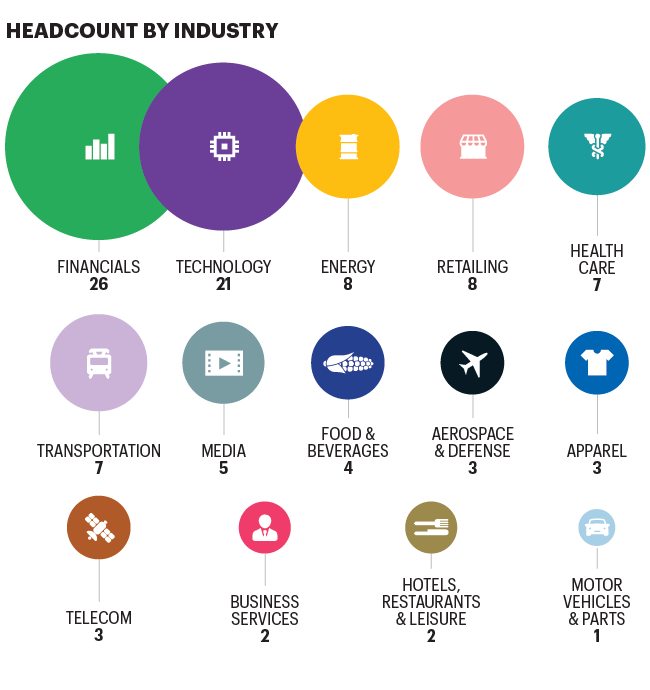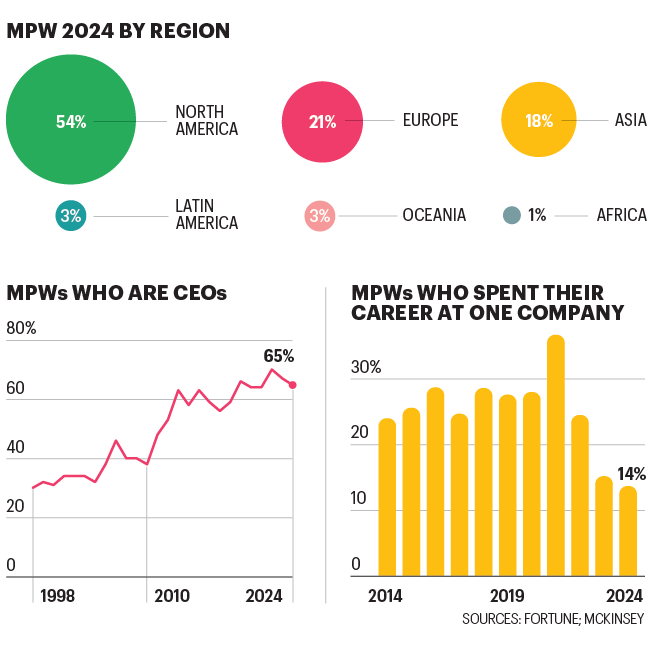About the 2024 list of the Most Powerful Women in business
When Fortune launched its Most Powerful Women list in 1998, women were just starting to trickle into the C-suite in significant numbers. “[Now] is the right time to bring you Fortune’s first-ever list of the 50 Most Powerful Women … because women, at last, are achieving profound power in the most important and influential industries,” Fortune wrote at the time. Women in business have certainly come a long way since then. No stat proves that better than the share of CEOs on the list. That first year, 15 CEOs made the inaugural ranking of 50. This year, women with that title represent well over half of the larger list of 100. Fifteen of the CEOs on this year’s list are brand-new to the ranking, while others are stalwarts who have retained power far beyond the average tenure of Fortune 500 male CEOs (7.2 years) and female CEOs (4.5 years). Our new No. 1, General Motors chair and CEO Mary Barra, is one of those mainstays; she’s led the automaker for 10 years and landed on our MPW list 13 times.
Using the format that we introduced last year, the 2024 MPW list ranks the 100 Most Powerful Women globally, reflecting corporations’ global scope and the nature of executives’ work, which spans the planet. The list features women from six continents, 18 countries and territories, and 14 different industries, proving there is no one-size-fits-all approach to reaching the pinnacle of business.
The 2024 ranking includes 26 newcomers in total, several of whom amassed their power somewhat recently amid the generative AI frenzy. Fei-Fei Li (No. 93), for instance, has long been among the most influential figures in artificial intelligence—she’s known as the “godmother” of the technology—largely from her seat as a researcher and academic. But this year the Stanford professor monetized that influence, raising $230 million from Andreessen Horowitz, AMD, and Nvidia for her own startup, reportedly valued at over $1 billion. Her new unicorn, World Labs, seeks to endow AI with “spatial intelligence,” or an understanding of the 3D world. Li is surely among the most respected founders to ever launch a startup, and she’s doing so with the kind of established influence most early-stage founders could only dream of.
Also part of the AI contingent are Anthropic president and cofounder Daniela Amodei (No. 94), whose Amazon-backed startup is valued at $18 billion; OpenAI chief technology officer Mira Murati (No. 57); and CFOs at tech giants that are dominant players in the AI race, including Nvidia’s Colette Kress (No. 16) and Microsoft’s Amy Hood (No. 20).
These leaders stand out in a male-dominated industry. According to the World Economic Forum’s 2024 global gender gap report, the share of professional men with skills in AI engineering is twice as large (at 0.41%) as the share of professional women (0.2%) with the same skills—although both have doubled since 2016.
AI leaders’ inclusion reflects how the MPW list doesn’t just consider who leads the corporate giants of today, but who may lead the world’s biggest businesses in the decades to come.
Alongside the newcomers are some of the women who have appeared on the MPW list the most times. Fidelity Investments CEO Abigail Johnson, a third-generation CEO who oversees $28.2 billion in revenue at a privately held company, has appeared on this list 24 times—more than any other executive in the 27-year history of the list. Johnson (No. 13) took over the company in 2014, but was on track for the job for more than a decade before it became official. She’s followed by No. 7, Oracle CEO Safra Catz (19 times); and No. 15, Spanish banking leader Ana Botín of Santander (17 times).

While CEOs dominate this year’s MPW ranking, a group of nine high-profile CFOs represent a growing share of the list. Fortune gives an edge to CEOs in vetting for the MPW list, but CFOs yield unique influence in the C-suite as trusted executives, especially when they’re managing the financial health of some of the most valuable companies on earth. Kress, a Microsoft alumna, has been key to Nvidia’s soaring stock price, turning most of the company’s workforce into multimillionaires as its market cap routinely hovers around $3 trillion.
At Meta, CFO Susan Li (No. 21) continues to draw attention as a key architect of the social media giant’s stunning turnaround, from a market cap of $250 billion upon Li’s promotion in November 2022 to more than $1 trillion in 2024. Notably, Li is only 38 years old—meaning that she still has decades to go in an already soaring career.
Then consider Anat Ashkenazi (No. 22), the new CFO at Alphabet, which earned more than $300 billion in revenue last year and has a market valuation of nearly $2 trillion. She succeeds Ruth Porat in the CFO job, which landed Porat in the No. 8 spot in 2023. Ashkenazi ranks lower, at No. 22, since she is untested in the role, recently arriving from Eli Lilly. And her predecessor is still around: Alphabet promoted Porat to president and chief investment officer, earning Porat the No. 6 spot this year and giving Alphabet CEO Sundar Pichai multiple options when seeking financial counsel.
Executives from the Asia-Pacific region represent another growing delegation on this year’s list. There are 20 such women on the ranking, up from 16 last year, including several “firsts.” JAL Group’s Mitsuko Tottori (No. 42) started as a flight attendant and became the first female CEO of the Japan Airlines parent this year. Bonnie Chan (No. 45), meanwhile, is the first-ever female CEO of Hong Kong Exchanges and Clearing, which operates the Hong Kong stock exchange. The 20 Asia-Pacific women on the global MPW list will also appear on Fortune’s MPW Asia list, which publishes for the first time this year.

Chan’s background is typical of this year’s Most Powerful Women in that she worked elsewhere before becoming HKEX CEO, including at Morgan Stanley and law firm Davis Polk & Wardwell. Only 14% of women on this year’s list have worked for just one company, down from more than 20% 10 years ago, according to an analysis of all MPW lists by Fortune’s intelligence partner McKinsey. One of the outliers is No. 1 Barra, who’s a GM lifer. Most top female executives today job-hop on their way into the C-suite. In fact, a 2022 study by McKinsey and LeanIn.org found that women were switching employers at record rates, in part because of the headwinds they faced in attaining senior-level roles.
All of the women on the 2024 list are outliers in another sense, in that they’ve advanced in a business world that’s still dominated by men. The most recent McKinsey and LeanIn study found that women have made gains in representation at the senior vice president level—29% in 2024 versus 23% in 2015—and in the C-suite—29% versus 17%—but that those gains are more fragile than they may seem. They result, in part, from companies adding to the C-suite “staff ”-level roles that women typically fill. Staff roles, including those overseeing departments like human resources and legal, have no profit-and-loss responsibility and are usually not stepping stones to becoming chief executive. But in that way, too, Barra defies conventional wisdom: Three years before she became GM CEO, Barra was the automaker’s global head of HR. —Claire Zillman & Emma Hinchliffe